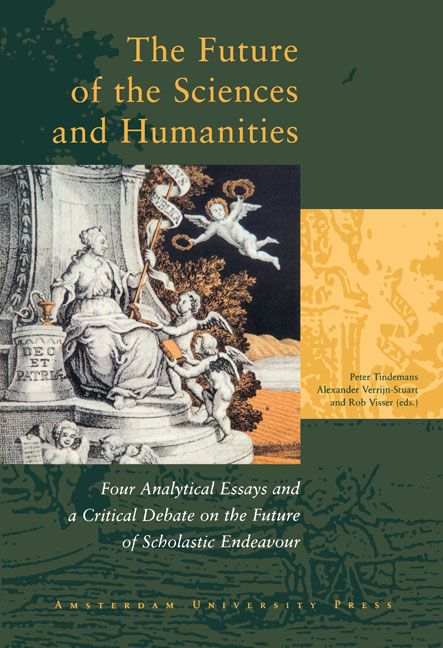 The Future of the Sciences and Humanities
The Future of the Sciences and Humanities Book contents
- Frontmatter
- Preface
- Contents
- 1 The Sciences and Arts Debate A review and some conclusions
- 2 Historical and Structural Approaches in the Natural and Human Sciences .
- The Role of Laws and Contingency in History
- 3 Science and Society in Flux
- Does A New Kind of Science Require a New Kind of Scholar or a New Kind of University?
- 4 Science for the 21st Century
- Redrawing Disciplinar Boundaries – but to What Degree?
- 5 Science and Democracy
- Science and Democracy: a Difficult Relationship: ‘An enlightened and elitist essay on an unresolvable problem’
- 6 Epilogue
- 7 Appendix
Science and Democracy: a Difficult Relationship: ‘An enlightened and elitist essay on an unresolvable problem’
Published online by Cambridge University Press: 03 February 2021
- Frontmatter
- Preface
- Contents
- 1 The Sciences and Arts Debate A review and some conclusions
- 2 Historical and Structural Approaches in the Natural and Human Sciences .
- The Role of Laws and Contingency in History
- 3 Science and Society in Flux
- Does A New Kind of Science Require a New Kind of Scholar or a New Kind of University?
- 4 Science for the 21st Century
- Redrawing Disciplinar Boundaries – but to What Degree?
- 5 Science and Democracy
- Science and Democracy: a Difficult Relationship: ‘An enlightened and elitist essay on an unresolvable problem’
- 6 Epilogue
- 7 Appendix
Summary
The ability to provide such inescapable answers in such penetrating and clear English to questions which the author himself says can barely be comprehended is given to but a few. Herman Philipse is one such, and I read his essay with great admiration and generally agreed with it, but sometimes also with a feeling of unease and even irritation. He resolves the typical 18th century contest question of the Hollandsche Maatschappij in a series of steps, ending in a notable Wahlverwandschaft of good politics, real democracy and modern science. That is almost too good to be true and leaves one feeling suspicious. The reality can only be less smooth than suggested here. Is what appears here as a perfect outcome of logical reasoning not in fact this infamous piece of soap that slips from one's grasp when one tries to get hold of it?
The opening starts as an elegant bow to the long history of the Maatschappij, turns soon into a harsh blow to the Dutch self-esteem. When the Hollandsche Maatschappij was set up as a learned society, the Republic of the Seven United Provinces was still wealthy but no longer powerful. The economy was in a drawn-out recession, and Philipse establishes a link here with the failure of the Republic in the field of science policy. In contrast to Britain and France, no investment was made in research and development. While that may be true, as an argument is it not an example of Whig history? In the Low Countries there was no question of a central government; science was the pastime of wealthy citizens, who in 1752 were not yet a leisure class in the traditional sense of the word. The first national institutions were established in French times by Louis Napoleon. Without him there would be no Rijksmuseum and no Royal Netherlands Academy of Arts and Sciences. What was missing in the ‘Netherlands’ was a powerful national government. I do not share Philipse's thesis that the Maatschappij was founded 100 years too late. In my opinion, it was the national state and a central government that was long overdue. .
- Type
- Chapter
- Information
- The Future of the Sciences and HumanitiesFour Analytical Essays and a Critical Debate on the Future of Scholastic Endeavor, pp. 221 - 226Publisher: Amsterdam University PressPrint publication year: 2002


